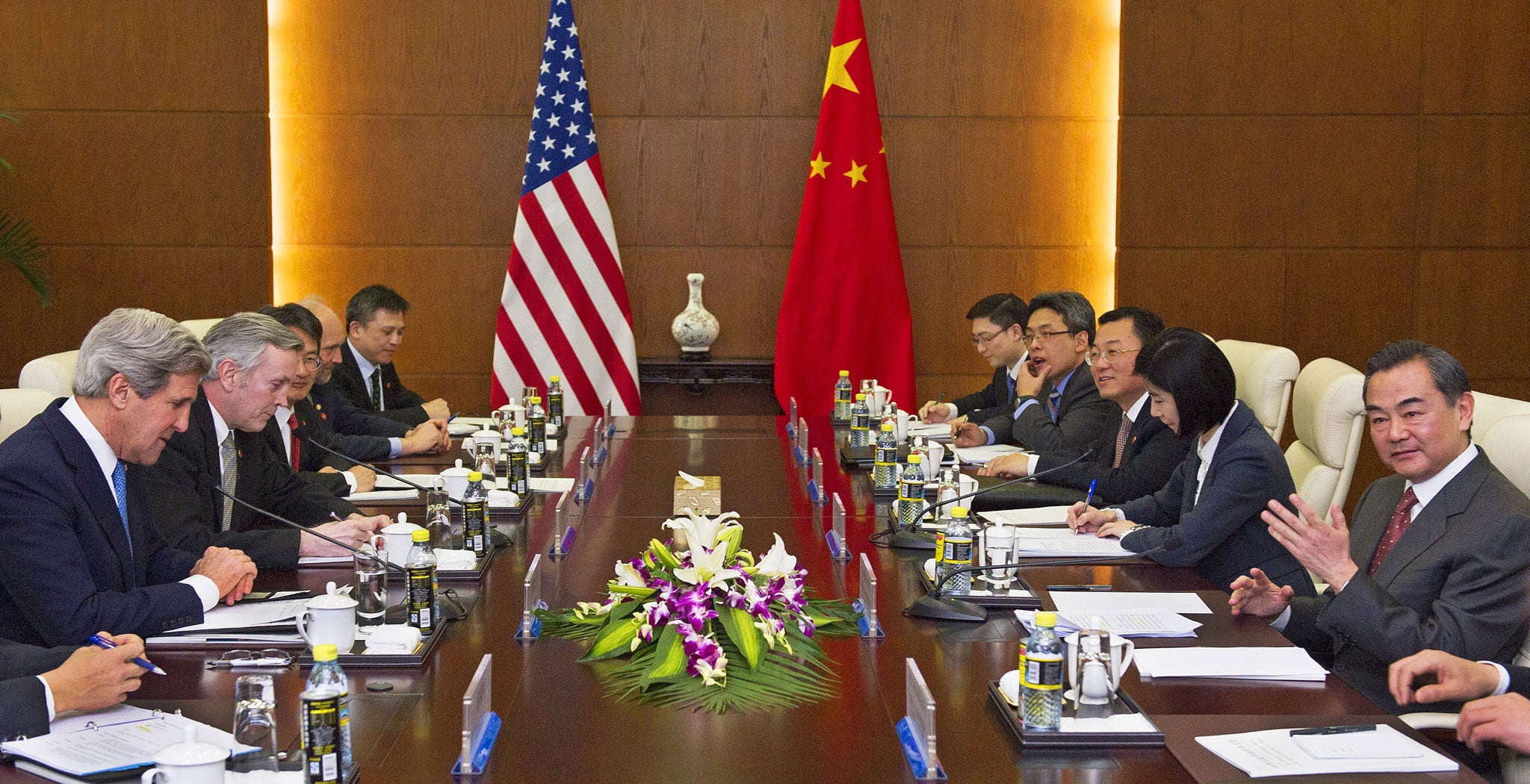John Kerry meets China's top leaders to discuss North Korea

Your support helps us to tell the story
From reproductive rights to climate change to Big Tech, The Independent is on the ground when the story is developing. Whether it's investigating the financials of Elon Musk's pro-Trump PAC or producing our latest documentary, 'The A Word', which shines a light on the American women fighting for reproductive rights, we know how important it is to parse out the facts from the messaging.
At such a critical moment in US history, we need reporters on the ground. Your donation allows us to keep sending journalists to speak to both sides of the story.
The Independent is trusted by Americans across the entire political spectrum. And unlike many other quality news outlets, we choose not to lock Americans out of our reporting and analysis with paywalls. We believe quality journalism should be available to everyone, paid for by those who can afford it.
Your support makes all the difference.US Secretary of State John Kerry met China's top leaders today in a bid to persuade them to exert pressure on North Korea to scale back its belligerent rhetoric and, eventually, return to nuclear talks.
Travelling to Beijing for the first time as secretary of state, Kerry made no secret of his desire to see China take a more activist stance towards North Korea, which in recent weeks has threatened nuclear war against the United States and South Korea.
As the North's main trading partner, financial backer and the closest thing it has to a diplomatic ally, China has a unique ability to use its leverage against the impoverished, isolated state, Kerry said in the South Korean capital, Seoul, on Friday before leaving for Beijing.
"Mr. President, this is obviously a critical time with some very challenging issues - issues on the Korean peninsula, the challenge of Iran and nuclear weapons, Syria and the Middle East, and economies around the world that are in need of a boost," Kerry told Chinese President Xi Jinping at the Great Hall of the People.
Kerry said after the meeting that his talks with Xi were "constructive and forward-leaning", though he did not elaborate.
China had a testy relationship with Kerry's predecessor, Hillary Clinton, believing her to be too abrasive in their disagreements over everything from human rights to territorial disputes like the South China Sea.
"Clinton added fuel to the mistrust during her four-year term. We hope Kerry can pull it in the other direction," China's widely read and influential Global Times tabloid said in an editorial.
Kerry's visit to Asia, which will include a stop in Tokyo tomorrow, takes place after weeks of shrill North Korean threats of war since the imposition of new UN sanctions in response to its third nuclear test in February.
North Korea has repeatedly said it will not abandon nuclear weapons which it said yesterday were its "treasured" guarantor of security.
North Korean television made no mention of Kerry's visit and devoted most of its reports to preparations for Monday's celebrations marking the birth date of state founder Kim Il-Sung.
These included a numerous floral tributes and grandiose flower show, foreign visitors seeing the sights of the capital ahead of the festivities and the unveiling of a monument in a provincial town.
But Rodong Sinmun, the ruling Workers' Party's newspaper, issued a fresh denunciation of joint US-South Korean military exercises, saying: "The outbreak of nuclear war has now become a fait accompli, owing to the US and the South Korean puppet forces.
"If the enemies dare provoke (North Korea) while going reckless, it will immediately blow them up with an annihilating strike with the use of powerful nuclear means."
However, South Korea's Yonhap news agency, quoting a government source, said North Korea had not moved any of its mobile missile launchers for the past two days after media reports that as many as five missiles had been moved into place on the country's east coast.
Yonhap said there had been no signs of any movement by the mobile launchers since Thursday "or that missile launches are imminent".
Beijing has been reluctant to apply pressure on Pyongyang, fearing the instability that could result if the North were to implode and send floods of refugees into China, and has looked askance at US military drills in South Korea.
China's official Xinhua news agency said in a commentary that Washington had itself been "fanning the flames" on the Korean peninsula with its shows of force.
"It keeps sending more fighters, bombers and missile-defence ships to the waters of East Asia and carrying out massive military drills with Asian allies in a dramatic display of preemptive power," it said.
However, US officials believe China's rhetoric on North Korea has begun to shift, pointing to a recent speech by China's Xi in which - without referring explicitly to Pyongyang - he said no country "should be allowed to throw a region and even the whole world into chaos for selfish gain".
Kerry told reporters in Seoul that if North Korea's 30-year-old leader went ahead with the launch of a medium-range missile, he would be making "a huge mistake."
At a news conference in Seoul yesterday and in a US-South Korean joint statement issued today, Kerry signalled the US preference for diplomacy to end the tension, but stressed North Korea must take "meaningful" steps on denuclearization.
The United States and its allies believe the North violated the a 2005 aid-for-denuclearization deal by conducting a nuclear test in 2006 and pursuing a uranium enrichment programme that would give it a second path to a nuclear weapon in addition to its plutonium-based programme.
REUTERS
Join our commenting forum
Join thought-provoking conversations, follow other Independent readers and see their replies
Comments